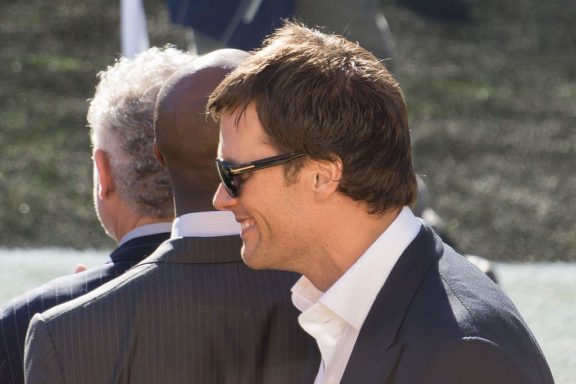
April 22, 2017; Boston Globe
Like many successful celebrities, in 2005, Tom Brady established a charity. Brady’s Change the World Foundation Trust was started as a 501(c)(3) private foundation with an initial contribution of just under $500,000, with all but $10,000 coming from Brady. In the decade since that initial contribution, Brady has contributed nothing to his own foundation, according to publicly available IRS records on GuideStar and the Urban Institute’s National Center for Charitable Statistics.
To us, this brings to mind the president’s Donald J. Trump Foundation, another high profile philanthropy named for, controlled by, and identified as the charity of one person while being funded by others. It may be legal, but is it ethical—especially when the celebrity is filthy rich? And, as with Trump, Brady’s charitable and business concerns are uncomfortably linked.
The trust’s IRS Form 990-PF returns show that Brady himself is the nonprofit’s sole trustee and has been since its founding. The trust’s charitable gifts have been related to Brady’s personal interests, with the largest gifts since 2011 going to Brady’s high school alma mater; the church where Brady married his wife, supermodel Giselle Bundchen; and the TB12 Foundation, a 501(c)(3) public charity described as “a charity Brady formed in 2015 to support clients of his Foxborough-based TB12 fitness and nutrition company.”
The overwhelming source of funding for Brady’s private foundation has been another nonprofit, Best Buddies International. Founded by Anthony K. Shriver, a nephew of President John F. Kennedy, Best Buddies is “the world’s largest organization dedicated to ending the social, physical and economic isolation of the 200 million people with intellectual and developmental disabilities (IDD),” providing “friendship, jobs & leadership development,” according to its website. The charity credits Brady with raising $46.5 million for Best Buddies since 2001.
Shriver quoted Brady as saying in 2011, “When I come to Best Buddies events, it’s all about Best Buddies, which is the way I want to keep it while I develop my interests. Would you support helping me pursue my things while I continue to put a lot of energy into your thing?” Best Buddies granted $250,000 to Change the World Foundation Trust in 2011 and increased the amount in subsequent years to $500,000 annually—a practice expected to continue into the foreseeable future.
Are these payments charitable gifts from Best Buddies, or are they a cost of fundraising paid by Best Buddies to Brady’s trust to compensate him for his participation? Based on the 2011 quote, it would seem that Shriver believes they are a cost of fundraising. However, Shriver says the grants are “appropriate honorariums” because Brady is more than a fundraiser: “He’s a global ambassador for the movement.”
Sign up for our free newsletters
Subscribe to NPQ's newsletters to have our top stories delivered directly to your inbox.
By signing up, you agree to our privacy policy and terms of use, and to receive messages from NPQ and our partners.
Charity watchdogs aren’t ready to agree. Art Taylor, president of the Better Business Bureau Wise Giving Alliance, says, “It looks sloppy. The charity might want to clean it up a little bit and say, Brady is providing this fundraising service to us, thus we are compensating him in this way.”
Daniel Borochoff, president of Charity Watch, said, “Sometimes the compensation is hard to find, and a celebrity gets credit for caring about something when the reason he actually cares about it is because he or his foundation is getting paid.” Brady “really can’t take credit for being a great philanthropist when he is using other people’s money to help his own organizations.”
Tom Brady has an estimated net worth of $180 million and his wife has an estimated net worth of $360 million, according to Celebrity Net Worth. Why would the wealthy couple stiff Tom’s own foundation while asking another charity to fund it? And why, until the Boston Globe started asking questions, was it so hard to understand the relationship between Best Buddies, Brady, and his private foundation?
Marc Pollick has been a longtime charitable advisor of athletes through his own charity and is now a consultant for the NFL Players Association. He advocates against arrangements like Brady’s agreement with Best Buddies. “It’s not good use of charitable money, and it’s bad for your reputation.”
By the way, the TB12 Foundation, founded in March of 2015, has filed an interesting 2015 IRS Form 990. According to the foundation’s return, its mission is “To enhance the health, well-being and athletic potential of promising young American amateur athletes by providing access to the ‘TB12 Method’ of athletic training.” Its Schedule L, Business Transactions Involving Interested Persons, notes that “board president, Thomas E P Brady, Jr, is an owner of TB12 LLC, which is the sole member of the corporation” and that “board treasurer/clerk, Jeffrey Surette, is employed as the senior vice president of TB12 LLC.” The foundation has no employees, though Surette was paid compensation of approximately $154,000 in 2015, according to the IRS filing. TB12 Foundation’s state filings, including its articles of incorporation and by-laws, may be accessed on the Massachusetts attorney general’s website.
There are two problems here: Using a charity to fund your private foundation (one that you haven’t supported in 10 years) and using another charity to support access to products and services sold by a for-profit company you own. It’s just plain ugly. While there may be nothing illegal happening, it calls for clear, definitive, and accountable explanation from the person at the center of it all—Tom Brady. Maybe it’s also time for Tom and Gisele to support Tom’s private foundation themselves.—Michael Wyland












